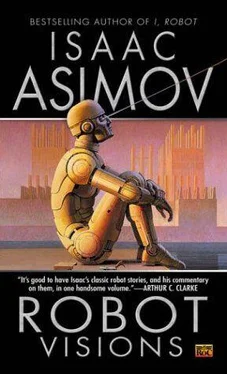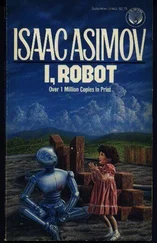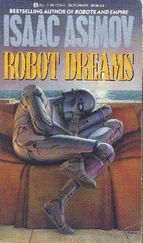Isaac Asimov - Robot Visions
Здесь есть возможность читать онлайн «Isaac Asimov - Robot Visions» весь текст электронной книги совершенно бесплатно (целиком полную версию без сокращений). В некоторых случаях можно слушать аудио, скачать через торрент в формате fb2 и присутствует краткое содержание. Жанр: Фантастика и фэнтези, на английском языке. Описание произведения, (предисловие) а так же отзывы посетителей доступны на портале библиотеки ЛибКат.
- Название:Robot Visions
- Автор:
- Жанр:
- Год:неизвестен
- ISBN:нет данных
- Рейтинг книги:5 / 5. Голосов: 1
-
Избранное:Добавить в избранное
- Отзывы:
-
Ваша оценка:
- 100
- 1
- 2
- 3
- 4
- 5
Robot Visions: краткое содержание, описание и аннотация
Предлагаем к чтению аннотацию, описание, краткое содержание или предисловие (зависит от того, что написал сам автор книги «Robot Visions»). Если вы не нашли необходимую информацию о книге — напишите в комментариях, мы постараемся отыскать её.
Robot Visions — читать онлайн бесплатно полную книгу (весь текст) целиком
Ниже представлен текст книги, разбитый по страницам. Система сохранения места последней прочитанной страницы, позволяет с удобством читать онлайн бесплатно книгу «Robot Visions», без необходимости каждый раз заново искать на чём Вы остановились. Поставьте закладку, и сможете в любой момент перейти на страницу, на которой закончили чтение.
Интервал:
Закладка:
“I will make a prediction. If you try any such thing, you will find yourself hampered at every turn. You will find it impossible to carry out. You will find your every move in that direction will result in trouble.”
Byerley was taken aback, “Why do you say that? I was rather hoping for your approval in this matter.”
“You can’t have it as long as your actions are based on a false premise. You admit the Machine can’t be wrong, and can’t be fed wrong data. I will now show you that it cannot be disobeyed, either, as you think is being done by the Society.”
“That I don’t see at all.”
“Then listen. Every action by any executive which does not follow the exact directions of the Machine he is working with becomes part of the data for the next problem. The Machine, therefore, knows that the executive has a certain tendency to disobey. He can incorporate that tendency into that data, – even quantitatively, that is, judging exactly how much and in what direction disobedience would occur. Its next answers would be just sufficiently biased so that after the executive concerned disobeyed, he would have automatically corrected those answers to optimal directions. The Machine knows, Stephen!”
“You can’t be sure of all this. You are guessing.”
“It is a guess based on a lifetime’s experience with robots. You had better rely on such a guess, Stephen.”
“But then what is left? The Machines themselves are correct and the premises they work on are correct. That we have agreed upon. Now you say that it cannot be disobeyed. Then what is wrong?”
“You have answered yourself. Nothing is wrong! Think about the Machines for a while, Stephen. They are robots, and they follow the First Law. But the Machines work not for any single human being, but for all humanity, so that the First Law becomes: ‘No Machine may harm humanity; or, through inaction, allow humanity to come to harm.’
“Very well, then, Stephen, what harms humanity? Economic dislocations most of all, from whatever cause. Wouldn’t you say so?”
“I would.”
“And what is most likely in the future to cause economic dislocations? Answer that, Stephen.”
“I should say,” replied Byerley, unwillingly, “the destruction of the Machines.”
“And so should I say, and so should the Machines say. Their first care, therefore, is to preserve themselves, for us. And so they are quietly taking care of the only elements left that threaten them. It is not the ‘Society for Humanity’ which is shaking the boat so that the Machines may be destroyed. You have been looking at the reverse of the picture. Say rather that the Machine is shaking the boat-very slightly-just enough to shake loose those few which cling to the side for purposes the Machines consider harmful to Humanity.
“So Vrasayana loses his factory and gets another job where he can do no harm – he is not badly hurt, he is not rendered incapable of earning a living, for the Machine cannot harm a human being more than minimally, and that only to save a greater number. Consolidated Cinnabar loses control at Almaden. Villafranca is no longer a civil engineer in charge of an important project. And the directors of World Steel are losing their grip on the industry – or will.”
“But you don’t really know all this,” insisted Byerley, distractedly. “How can we possibly take a chance on your being right?”
“You must. Do you remember the Machine’s own statement when you presented the problem to him? It was: ‘The matter admits of no explanation.’ The Machine did not say there was no explanation, or that it could determine no explanation. It simply was not going to admit any explanation. In other words, it would be harmful to humanity to have the explanation known, and that’s why we can only guess – and keep on guessing.”
“But how can the explanation do us harm? Assume that you are right, Susan.”
“Why, Stephen, if I am right, it means that the Machine is conducting our future for us not only simply in direct answer to our direct questions, but in general answer to the world situation and to human psychology as a whole. And to know that may make us unhappy and may hurt our pride. The Machine cannot, must not, make us unhappy.
“Stephen, how do we know what the ultimate good of Humanity will entail? We haven’t at our disposal the infinite factors that the Machine has at its! Perhaps, to give you a not unfamiliar example, our entire technical civilization has created more unhappiness and misery than it has removed. Perhaps an agrarian or pastoral civilization, with less culture and less people would be better. If so, the Machines must move in that direction, preferably without telling us, since in our ignorant prejudices we only know that what we are used to, is good – and we would then fight change. Or perhaps a complete urbanization, or a completely caste-ridden society, or complete anarchy, is the answer. We don’t know. Only the Machines know, and they are going there and taking us with them.”
“But you are telling me, Susan, that the ‘Society for Humanity’ is right; and that Mankind has lost its own say in its future.”
“It never had any, really. It was always at the mercy of economic and sociological forces it did not understand – at the whims of climate, and the fortunes of war. Now the Machines understand them; and no one can stop them, since the Machines will deal with them as they are dealing with the Society, – having, as they do, the greatest of weapons at their disposal, the absolute control of our economy.”
“How horrible!”
“Perhaps how wonderful! Think, that for all time, all conflicts are finally evitable. Only the Machines, from now on, are inevitable!”
And the fire behind the quartz went out and only a curl of smoke was left to indicate its place.
Feminine Intuition
For the first time in the history of United States Robots and Mechanical Men Corporation, a robot had been destroyed through accident on Earth itself.
No one was to blame. The air vehicle had been demolished in mid-air and an unbelieving investigating committee was wondering whether they really dared announce the evidence that it had been hit by a meteorite. Nothing else could have been fast enough to prevent automatic avoidance; nothing else could have done the damage short of a nuclear blast and that was out of the question.
Tie that in with a report of a flash in the night sky just before the vehicle had exploded-and from Flagstaff Observatory, not from an amateur-and the location of a sizable and distinctly meteoric bit of iron freshly gouged into the ground a mile from the site and what other conclusion could be arrived at?
Still, nothing like that had ever happened before and calculations of the odds against it yielded monstrous figures. Yet even colossal improbabilities can happen sometimes.
At the offices of United States Robots, the hows and whys of it were secondary. The real point was that a robot had been destroyed.
That, in itself, was distressing.
The fact that JN-5 had been a prototype, the first, after four earlier attempts, to have been placed in the field, was even more distressing.
The fact that JN-5 was a radically new type of robot, quite different from anything ever built before, was abysmally distressing.
The fact that JN-5 had apparently accomplished something before its destruction that was incalculably important and that that accomplishment might now be forever gone, placed the distress utterly beyond words.
It seemed scarcely worth mentioning that, along with the robot, the Chief Robopsychologist of United States Robots had also died.
Clinton Madarian had joined the firm ten years before. For five of those years, he had worked uncomplainingly under the grumpy supervision of Susan Calvin.
Читать дальшеИнтервал:
Закладка:
Похожие книги на «Robot Visions»
Представляем Вашему вниманию похожие книги на «Robot Visions» списком для выбора. Мы отобрали схожую по названию и смыслу литературу в надежде предоставить читателям больше вариантов отыскать новые, интересные, ещё непрочитанные произведения.
Обсуждение, отзывы о книге «Robot Visions» и просто собственные мнения читателей. Оставьте ваши комментарии, напишите, что Вы думаете о произведении, его смысле или главных героях. Укажите что конкретно понравилось, а что нет, и почему Вы так считаете.








